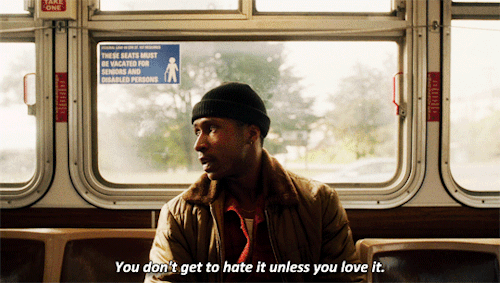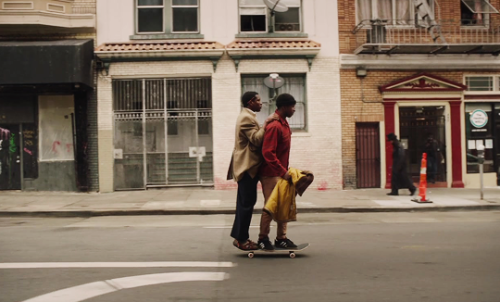
The Last Black Man in San Fransisco is the first feature film from director Joe Talbot. The story was developed alongside Jimmie Fails who plays the lead character by the same name. The story is also partly based on experiences of Fails who was born and raised in San Fransisco. This beautifully shot and edited film works as a complex love story between a man and a city that has neglected him.
THEY LEFT DICKENS! PHILISTINES, BRO!
Montgomery Allen & Jimmie Fails, The Last Black Man in San Francisco (2019)
In his debut film, Joe Talbot creates a beautiful and personal vision into identity, gentrification, and friendship. These three themes are woven into every aspect of the movie, sometimes very subtly and sometimes very loudly. These thematic elements are accompanied by the pure art of the filming! It really feels like you are inside a piece of art at a museum that has come to life at many points in the movie.
The performances are spectacular. Jimmie Fails, who inspired the story and helped write it, plays himself with this quiet heaviness that you feel the whole movie. He has this way of making you feel what he is feeling by doing practically nothing, by just sitting in the atmosphere of the moment. There are other good performances by Danny Glover, Mike Epps, Rob Morgan, Finn Wittrock, and even first time actor Jamal Trulove. But Jonathon Majors steals the show as Jimmie’s best friend Mont. He plays with this artistic sincerity that is in different ways both endearing and inspiring. I wanted him to be my best friend too!
The movie begins with this scene of a street preacher speaking pretty obviously of gentrification, of how things are changing but they didn’t want to make things better until the affluent people began to move in. Then it cuts to Jimmie and Mont watching him. They leave, both riding together on Jimmie’s skateboard and we get one of the most captivating scenes I’ve ever watched in a movie. The camera follows them skateboarding together (both on the same board) through San Francisco. We get to see the beauty of it (not in the landmark sights but in the mundane) from the eyes of someone who loves the city. And at the same time we get a picture of their friendship as they push off to keep momentum in sync. All the while we are getting a vision of the changing city, new buildings and construction being built where affluent people have moved in. We start the film seeing a city through the loving but saddened eyes of two friends who love something that doesn’t love them back. It really is an amazing opening scene.

I think the movie does a fantastic job of speaking to the three themes I mentioned above. Gentrification is addressed, but not in a simple way. It is addressed in a contemplative way. It is thinking about it and not really knowing what to do with it just like we are here in America. I have worked several times with a new church up in Red Hook, Brooklyn. Red Hook has the 2nd largest housing project in NYC, but when hurricane Sandy hit, the coast side of Red Hook was wiped out and now is being rebuilt and occupied by more affluent artists and hipsters. The pastor has a heart for reconciling these two groups of people separated only by a small park in the middle of the neighborhood. But it’s not a simple task. And I really felt that this movie did justice to this by struggling through the issue and not necessarily giving a black and white answer.

– Jimmie Fails, The Last Black Man in San Fransisco (2019)
“People are more than just one thing.”
—Spoilers Below—
Identity is something we all struggle with. I believe that what we see as our identity can and will end up influencing everything we do. But identity is not something that we create from within. It is something we discover from without. Jimmie is a guy who has so many aspects from without influencing who he thinks he is. He’s got separated parents with a mom that he doesn’t really know. He’s lived in a big Victorian home in the heart of San Francisco, a low income group home on its outskirts, and with Mont and his grandfather. He isn’t sure where he lies in the spectrum of the guys on the street and Mont’s artistic life. What makes him a man? He is holding on to the myth that his grandfather built that Victorian home and that it somehow defines him. He was made for it and it for him. It takes Mont screaming at him in his play toward the end to shake him out of it. “You are not these walls!” he cries. It’s an incredible scene! And when someone has their identity shaken, where they find their value and worth ripped from them, it is devastating. These are watershed moments. We can either begin to discover our true identity or turn in on ourselves and crumble or simply find something else just as empty to replace what we lost. The movie captures all of this with a weight and beauty that I loved!
And finally friendship. Jimmie and Mont have a friendship that we should all aspire for. It is a deep and vulnerable friendship that is foreign to so many that they might even mistake their love for one another as romantic, but it is a true friendship! They both open up to one another and inspire one another. They tell each other hard truths and laugh and act crazy together. They can be who they truly are with one another. And they support one another even if they don’t understand the other in that moment. And this all leads me to my response to some of the criticism of the movie. Many have said that the message of the movie gets lost in both the quirkiness of it and the bluntness of it. I’ve heard several critics talk about how the emotion at the end didn’t land because Mont was just screaming the themes of the movie at us. But this is why they are wrong. In that moment in his play, Mont is no longer an actor speaking to an audience. He is a man speaking to his friend. Sure, an artist often speaks with tact and subtlety, causing the emotion to sweep us away unknowingly. But a when the themes cease to be an art piece and become instead something very personal, affecting a person you love dearly, the emotion takes you over. Mont is speaking to his friend here, not us. He is having a personal (though not private) conversation to reveal to his best friend a deep truth. The play ends and all of the people who don’t really know Jimmie or Mont leave confused and thinking they wasted their time. I think critics that have left thinking the movie didn’t land the emotion were simply not seeing this scene and others like it from the right perspective.
I could really go on and on about everything I loved about this film, and it certainly takes time to process it. It is cemented as one of my favorites of 2019, and might even move up on further viewings. This is a must see movie! Please see this movie, and please let yourself be one overtaken by the emotion of this friendship and struggle through identity and gentrification, not just a removed spectator.





